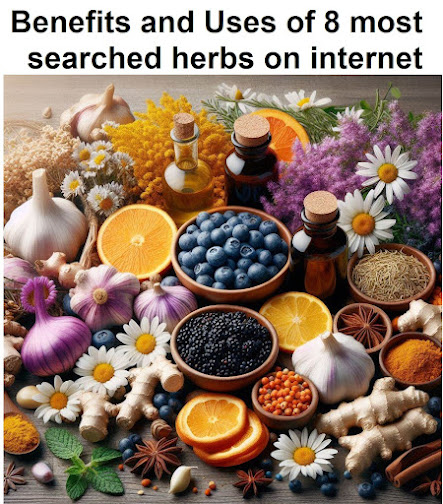Most searched herbs on the web - Benefits and Uses
The medicinal properties, uses, and benefits of each of these herbs are given hereunder:
.jpg)
Echinacea:
- What it is: Echinacea, also known as purple coneflower, belongs to a group of flowering plants native to North America.
- Medicinal Properties:
- Rich in antioxidants, it supports immunity and may help reduce inflammation.
- Contains compounds like flavonoids and rosmarinic acid.
- Uses and Benefits:
- Traditionally used by Native Americans for various ailments.
- Over-the-counter remedy for the common cold, flu, pain, and migraines.
- May aid in immune system function
Garlic:
- What it is: Garlic, a pungent bulb, has been used for centuries in various cultures.
- Medicinal Properties:
- Contains allicin, which has anti-inflammatory and antioxidant effects.
- Supports cardiovascular health and may help reduce blood pressure and cholesterol.
- Uses and Benefits:
- Used to treat nausea, infections, and respiratory issues.
- May aid weight loss and improve memory.
- Antioxidant properties protect against oxidative damage.
Ginger:
- What it is: Ginger, from Southeast Asia, is related to turmeric and cardamom.
- Medicinal Properties:
- Contains gingerol, an anti-inflammatory compound.
- Boosts immunity and aids digestion.
- Uses and Benefits:
- Helps with nausea, including morning sickness.
- May aid weight loss and improve brain health.
- Fights inflammation and has antioxidant effects.
Valerian:
- What it is: Valerian, a perennial plant, has been used since ancient times.
- Medicinal Properties:
- Contains valerenic acid with sedative effects.
- Used for insomnia, nervous tension, and anxiety.
- Uses and Benefits:
- Promotes relaxation and sleep.
- Historically used for various conditions.
- Safety data limited; consult a doctor before use.
Turmeric:
- What it is: Turmeric, a spice, contains curcumin as its active compound.
- Medicinal Properties:
- Curcumin has anti-inflammatory and antioxidant effects.
- Enhances brain health and fights free radicals.
- Uses and Benefits:
- Supports joint health and may prevent cancer.
- Improves memory and helps manage depression.
- Often used in curries and supplements.
German Chamomile:
- What it is: German chamomile is an herb with daisy-like flowers.
- Medicinal Properties:
- Contains chamazulene, an anti-inflammatory compound.
- Used for relaxation and soothing effects.
- Uses and Benefits:
- Promotes calmness and eases anxiety.
- Supports digestive health and skin conditions.
- Commonly brewed as a tea.
Elder Berry:
- What it is: Elderberry comes from the elder tree.
- Medicinal Properties:
- Rich in antioxidants and flavonoids.
- Supports immune function.
- Uses and Benefits:
- Traditionally used for colds and flu.
- May reduce symptoms and duration of illness.
- Available as syrups, teas, and supplements.
Ashwagandha:
- What it is: Ashwagandha, an adaptogenic herb, has been used in Ayurvedic medicine.
- Medicinal Properties:
- Contains withanolides, which have stress-reducing effects.
- Supports adrenal health and balances hormones.
- Uses and Benefits:
- Helps manage stress and anxiety.
- Enhances energy levels and cognitive function.
- Available as capsules or powders.
Remember to consult a healthcare professional before using any herbs or supplements, especially if you have specific health conditions or are taking medications. Each herb has unique properties, and individual responses may vary.
.jpg)
